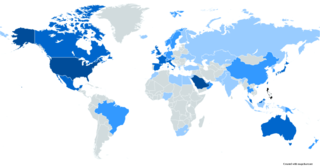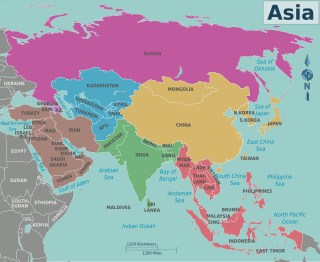
Overseas Chinese people are those of Chinese birth or ethnicity who reside outside mainland China, Taiwan, Hong Kong and Macau. As of 2011, there were over 40.3 million overseas Chinese. Overall China has low precent of population living overseas.

An Overseas Filipino is a person of full or partial Filipino origin who trace their ancestry back to the Philippines but are living and working outside of the country. They get jobs in countries and they move to live in countries that they get jobs in. This term generally applies to both people of Filipino ancestry and citizens abroad. As of 2019, there were over 12 million Filipinos overseas.

The Cantonese people or Yue people, are a Han Chinese subgroup originating from or residing in the provinces of Guangdong and Guangxi, in southern mainland China. In a strict sense, "Cantonese" refers only to people with roots from Guangzhou and its satellite cities and towns, rather than generally referring to the people of the Liangguang region.

Waves of Chinese emigration have happened throughout history. They include the emigration to Southeast Asia beginning from the 10th century during the Tang dynasty, to the Americas during the 19th century, particularly during the California gold rush in the mid-1800s; general emigration initially around the early to mid 20th century which was mainly caused by corruption, starvation, and war due to the Warlord Era, the Second Sino-Japanese War and the Chinese Civil War; and finally elective emigration to various countries. Most emigrants were peasants and manual labourers, although there were also educated individuals who brought their various expertises to their new destinations. As of 2023, illegal Chinese immigration to New York City has accelerated, and its Flushing (法拉盛), Queens neighborhood has become the present-day global epicenter receiving Chinese immigration as well as the international control center directing such migration.
Renunciation of citizenship is the voluntary loss of citizenship. It is the opposite of naturalization, whereby a person voluntarily obtains citizenship. It is distinct from denaturalization, where citizenship is revoked by the state.

Singapore nationality law details the conditions by which a person holds Singapore nationality. The primary law governing nationality requirements is the Constitution of Singapore, which came into force on 9 August 1965.

Singaporeans in the United Kingdom may refer to people who have full or partial Singaporean origin or descent, born or settled in the United Kingdom, or Singaporeans in Britain which are high-income expatriate professionals as well as skilled workers, with many still maintaining close ties with Singapore, especially those who continue to retain Singaporean citizenship while having permanent residency in Britain, as well as students.
The British diaspora consists of people of English, Scottish, Welsh, Northern Irish, Cornish, Manx and Channel Islands ancestral descent who live outside of the United Kingdom and its Crown Dependencies.

Overseas Indonesians refers to Indonesians who live outside of Indonesia. These include citizens that have migrated to another country as well as people born abroad of Indonesian descent. According to Ministry of Law and Human Rights, more than 6 million Indonesians diaspora live abroad in 2023 this include ex-Indonesian citizens, foreign citizens who are children of Indonesian citizens, and children of ex-Indonesian citizens, illegal and undocumented workers.

Emigration from the United States is the process where citizens from the United States move to live in countries other than the US, creating an American Diaspora. The process is the reverse of the immigration to the United States. The United States does not keep track of emigration and counts of Americans abroad are thus only available based on statistics kept by the destination countries.

Singaporean Australians are Australians of Singaporean descent. As Singapore is a multi-racial country, a Singaporean Australian could either be of Chinese, Malay or Indian descent, the main races of Singapore. According to the 2006 Australian census, 39,969 Australians were born in Singapore while 4,626 claimed Singaporean ancestry, either alone or with another ancestry.

Overseas Indians, officially Non-Resident Indians (NRIs) and People of Indian Origin (PIOs) are Indians who reside or originate outside of India. According to the Government of India, Non-Resident Indians are citizens of India who currently are not living in India, while the term People of Indian Origin refers to people of Indian birth or ancestry who are citizens of countries other than India. Overseas Citizenship of India (OCI) is given to People of Indian Origin and to persons who are not People of Indian Origin but married to Indian citizen or People of Indian Origin. Persons with OCI status are known as Overseas Citizens of India (OCIs). The OCI status is a permanent visa for visiting India with a foreign passport.
The Sri Lankan diaspora are Sri Lankan emigrants and expatriates from Sri Lanka, and their descendants, that reside in a foreign country. They number a total estimated population of around 3 million.

Singaporeans are the citizens and nationals of the sovereign island city-state of Singapore. Singapore is home to a people of a variety of ethno-racial origins, with the city-state itself being a multi-racial, multi-cultural, multi-religious, and multi-lingual country. Singaporeans of Chinese, Malay, Indian and Eurasian descent have made up the overwhelming majority of the population since the 19th century. The Singaporean diaspora is also far-reaching worldwide.

The Palestinian diaspora, part of the wider Arab diaspora, are Palestinian people living outside the region of Palestine.
The Malaysian diaspora are Malaysian emigrants from Malaysia and their descendants that reside in a foreign country. Population estimates vary from seven hundred thousand to one million, both descendants of early emigrants from Malaysia, as well as more recent emigrants from Malaysia. The largest of these foreign communities are in Singapore, Australia, Brunei and the United Kingdom.

Malaysians are citizens who are identified with the country of Malaysia. Although citizens make up the majority of Malaysians, non-citizen residents and overseas Malaysians may also claim a Malaysian identity.

The Tamil Nadu diaspora comprises people who have emigrated from South Indian state of Tamil Nadu, to other non-Tamil Indian states and other countries, and people of Tamil Nadu descent born or residing in other non-Tamil Indian states and other countries.
Malaysians in Singapore refers to citizens of Malaysia or Singaporean citizens of Malaysian origin residing in Singapore. According to the United Nations Department of Economic and Social Affairs, the community had a population of 952,261 in 2019, making them the world's largest Malaysian diaspora community. The community is also the largest foreign community in Singapore, constituting 44% of the country's foreign-born population and an additional 350,000 Malaysians cross the Johor–Singapore Causeway daily for work and school in the city-state.

The Asian diaspora is the diasporic group of people whose ancestral origins lie in Asia, but who live outside of the continent. There are several prominent groups within the Asian diaspora.














